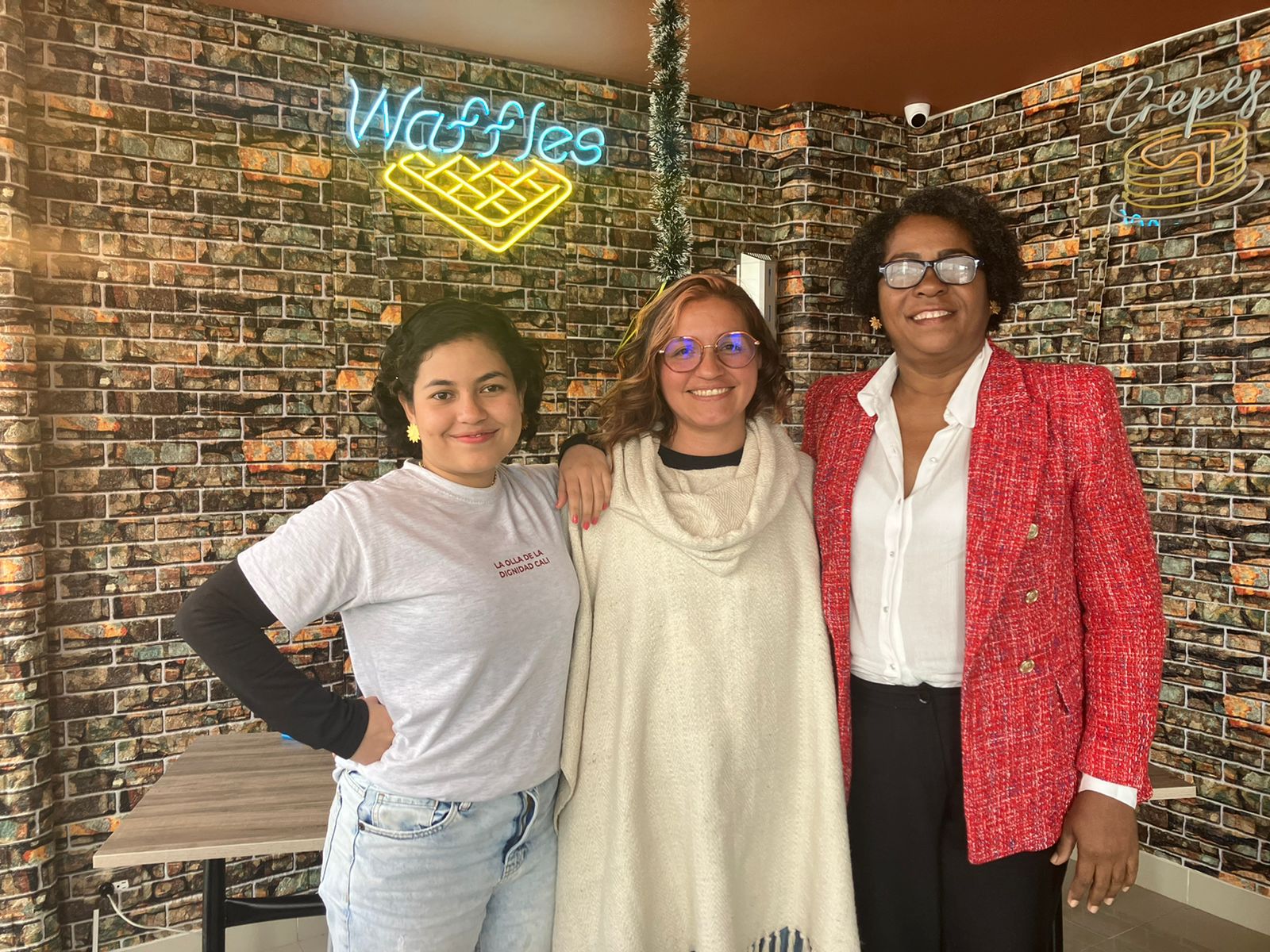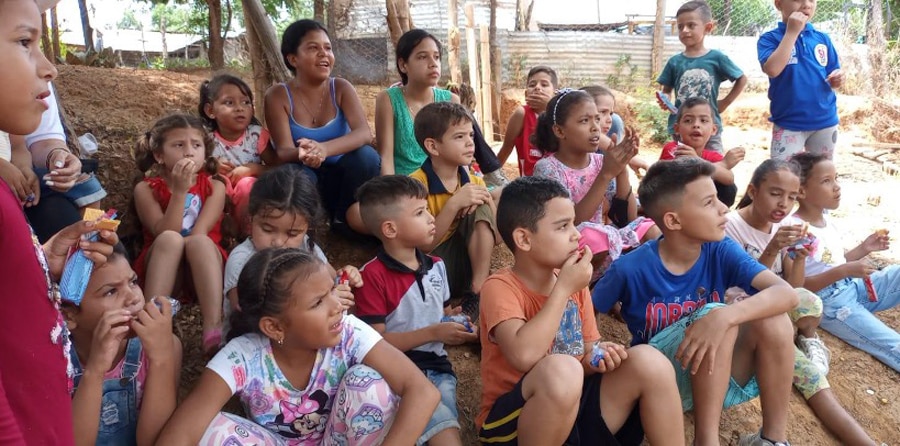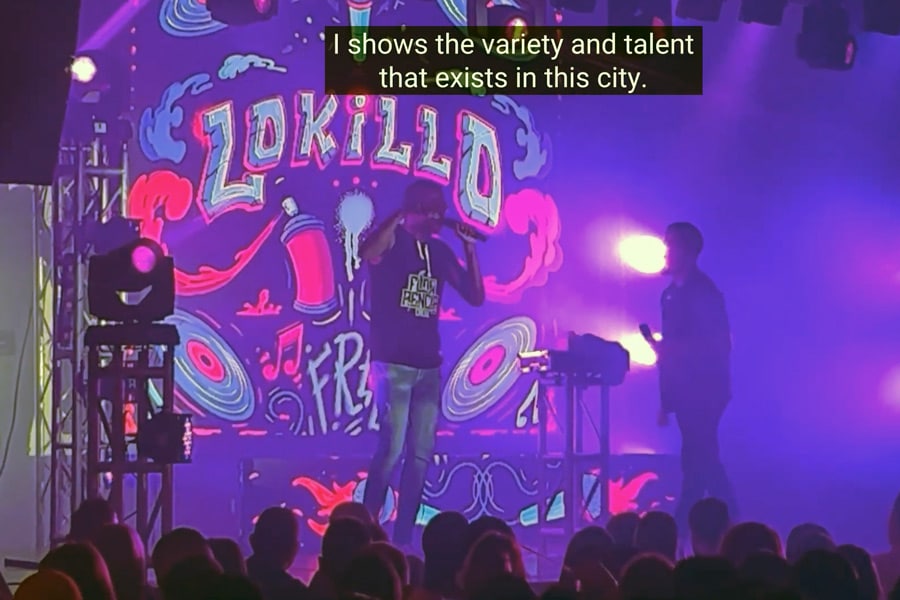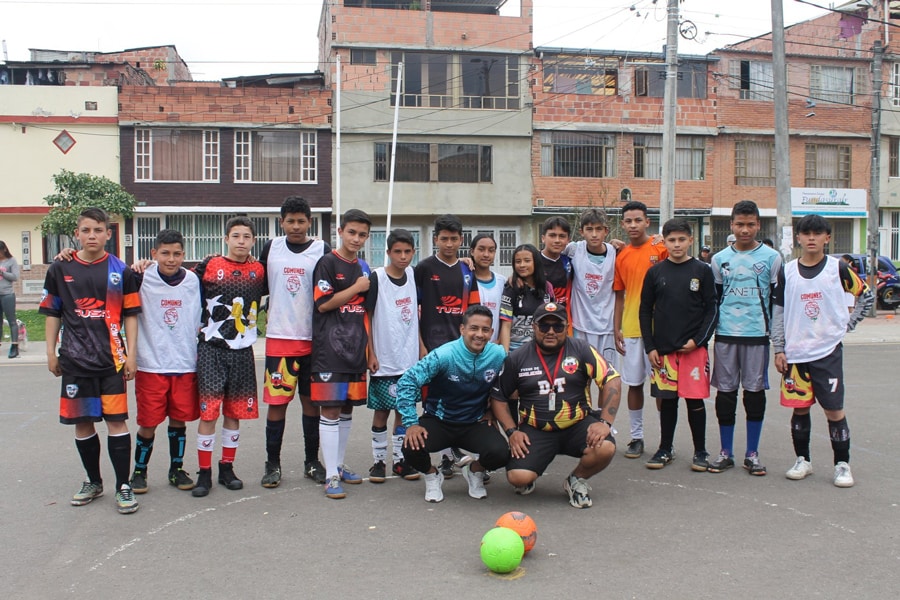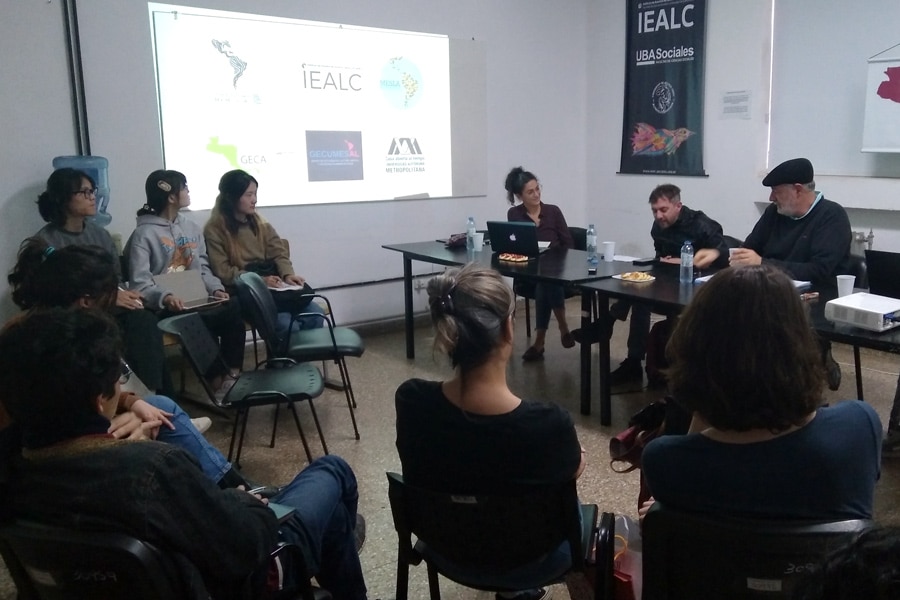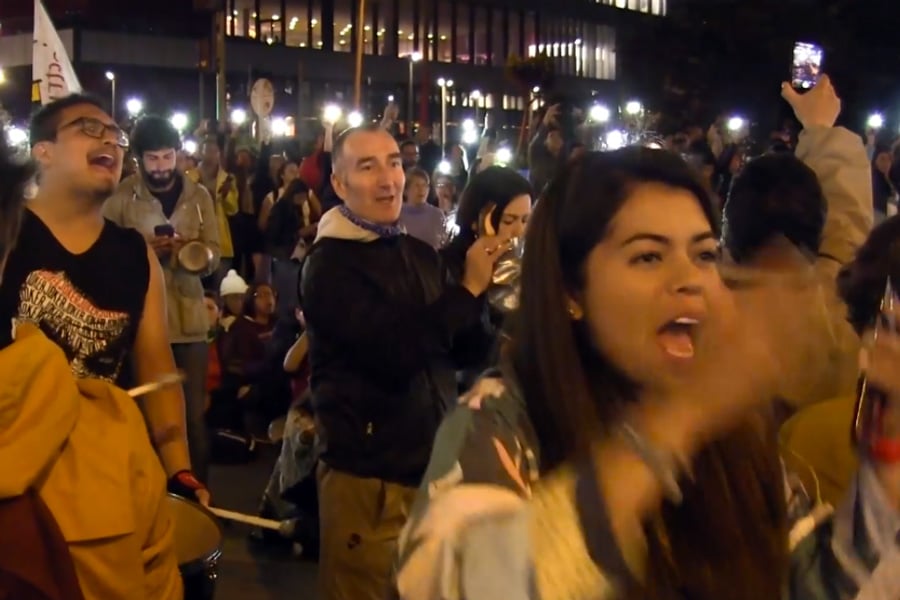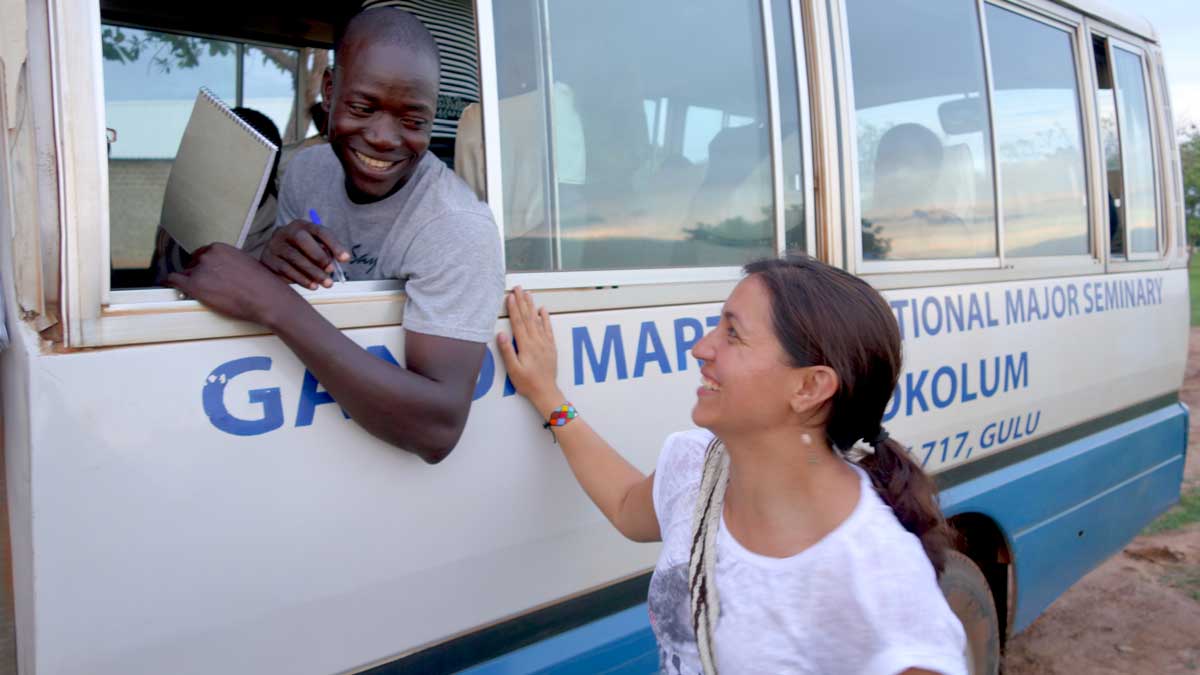Celebrating the Graduation of the 2022 Goldin Global Fellows Spanish Cohort
Creating an accessible leadership program for Spanish-speaking grassroots leaders
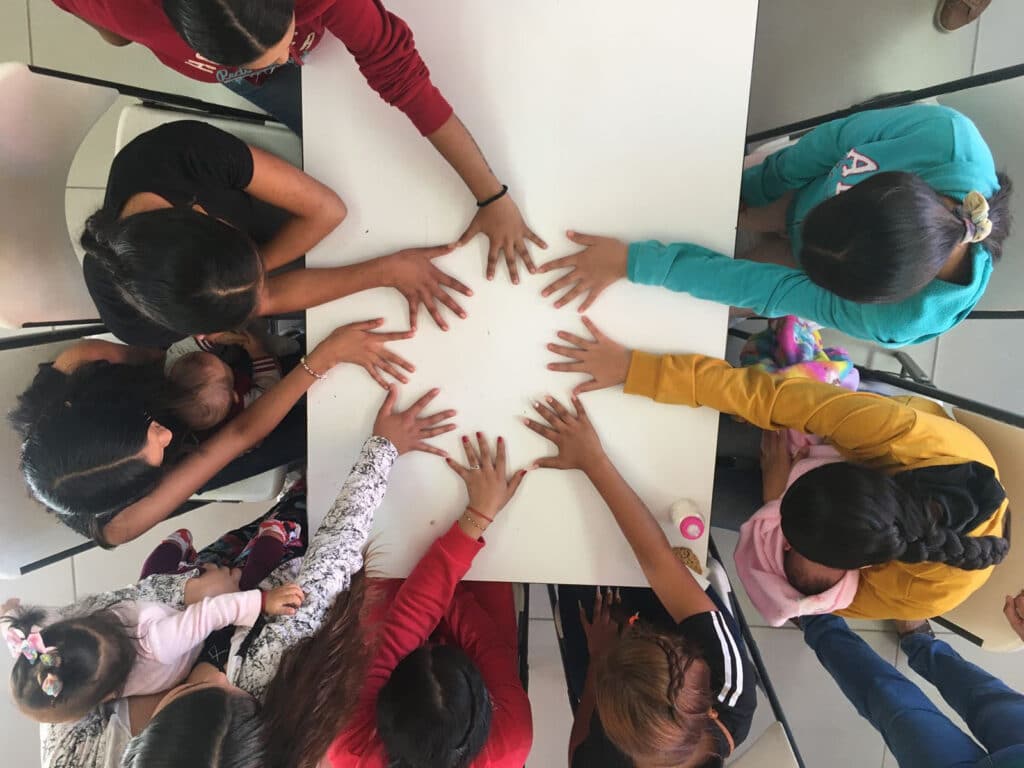
On December 10th we celebrated the graduation of the first Goldin Global Fellows program in Spanish language, where 17 Spanish-speaking grassroots leaders from eight countries in Latin America and Europe came together to create a new community of practice.
Since 2018, we've held onto the dream of offering the Fellows program in Spanish. True to Goldin Institute’s principles of ensuring that resources and connections are accessible to as many grassroots communities around the world as possible, offering the program in Spanish has long a priority for our whole team. Removing language barriers -- which included translating the curriculum, readings and videos in the GATHER Platform from English to Spanish -- was not an easy process. But I can say the effort to offer this course in Spanish has been worthwhile, especially for me as a Spanish-speaking activist who has been able to find a community who speaks in my native tongue and who are also working on both similar and different issues.
“Gather is knowledge and collective construction.” -- Luis Alomia, Colombia
During the recruitment process we counted on our Alumni, friends and colleagues from Colombia and Latin American countries to help us share the news of the application and spread the word. We were delighted to receive applications from a diverse group of grassroots leaders from over 10 countries that crossed many divides in our society, bring together youth and elders, leaders from rural places and main cities, victims of violence and former combatants. Together, these individuals represented a wide range of sectors, including environment, law, education, technology, peace and reconciliation, arts, memory, sports, theater, and more.
“Gather is a before and after of my leadership. I am happy since they contributed to broaden my vision and knowledge that will help me to build solutions that can be lasting over time and see communities as a treasure of active resources and that will be an example of good practices for other communities that want to join the transformation”. -- Natasha Duque Torres, Venezuela
It was truly a very diverse group, each doing beautiful work individually, but tied together by the common bond of being leaders on the front lines where life revolves around changing their communities and finding solutions every day. From these applicants, we selected 17 individuals who became the first Spanish-speaking cohort.
As a facilitator I was impressed when talking with our Fellows about the learnings and concepts delivered in the program, and realized how their perspectives and ideas about their community and social-change work had begun to develop and adapt. Indeed, they became more aware that new solutions had to be based on all the assets they always had but may not have seen in their communities. It was also moving to see how they started imaging a new understanding of leadership which counts on the whole community, giving opportunities to those often left behind. I was further impressed at how sensitive they became; in our conversations we sometimes cried noticing the changes they were going through and how new concepts gave them a vision of collectiveness.
"Gather has allowed me to broaden my horizons as a social leader by identifying and valuing resources and assets that we have as a community, as well as empowering the leadership of my colleagues based on the recognition of their individual strengths and interests in community work." -- Diana Rocio Gomez Torres, Argentina
Fellows felt that the course on the GATHER Platform was different from other courses because they had a strong sense of support from the Goldin Institute team and meaningful relationships with their peers.
It’s like a family that we can always count on, no matter what.
In our roundtable “Reflections and Critical Moments” one of the most broadly shared reflection was that the Fellows felt like they were not alone in this program, knowing there were other leaders around the world doing the same and learning alongside them. For example, Ernst from Haiti would tell us about the challenging times facing the Haitian population due to the political situation in his country, or Eva in Argentina would share that she faced many struggles for raising her voice against state violence. We also exchanged positive and happy stories too, for example Manuella shared about her journey from Quibdo (Colombia) to Spain to talk about how successful her project about football was there, or Nuria from México who got to be involved in a project to protect underage pregnant girls. We also had Martha from Guapi (Colombia) who graduated from her specialization during the Fellows program and Arturo from Bogota (Colombia) and his “Picaditos” Football matches with youth when they launched their book “La Prisión que Jamás me Contuvo” written by a former combatant. All of us looked forward to meeting each Saturday where we shared beautiful moments with each other during our weekly GATHER Roundtables.
“Gather is a seedbed in which the strengths, abilities and natural gifts of leaderships are brought out.” -- Geiner Arrieta, Colombia
So when the Program came to an end, Fellows wanted their graduation to be like a party; a celebration of life, cultures, learnings, our individuality and how this makes sense in community. Fellows celebrated with drinks from their territories, showing off their typical customs or any other item that represented them. We also had a freestyle performance by Johnathan, and a video of some musicians and dancers from the region where one of our youngest fellows, Luis Alomia, is from.
“My Gather experience has helped me to see that the actor of change that I want to be requires the participation of everyone in my community. Having grown up in a society where exclusion is the norm, Goldin has given me the necessary tools to be a true agent of change by collaborating with others and identifying our resources to be able to dream big together”. -- Ernst Djeride, Haiti
I have to say the best part of the celebration was the desire of Fellows to talk about the future and their optimism for new collective projects. They want to move forward, grow, and build together. Fellows Manuela and Arturo proposed four lines of work for Fellows in 2023:
-
- Creating a shared asset map with the purpose to realize a meeting of sharing vision. To have it real, we need a plan to know what we have, what can we do to meet us face to face together and develop our community visioning summit.
- Monthly meetings where each person of this cohort can lead one of the meetings.
- A directory of all the members of the Alumni network with their strengths and special topics and projects where they work.
- Participate in all the workshops set up by the Goldin Institute so we can learn, meeting new people and collaborate in new projects.
- We can share our networks, follow each other, and get to know what each one is doing, as well as and distribute what others are doing, including Goldin Institute’s social networks.
- We need help from the Goldin Institute to present our projects in case we need representation.
"Gather has given me the chance to meet my community again, open up to new listening, in order to collaborate on the paths we are charting together”. -- Nora Gabriela Fuentealba Rivas, Chile
And now, Fellows faithful to the principles they learned during the Goldin Global Fellows program wanted to remove barriers of distance so some of them made the efforts to meet with each other in person!
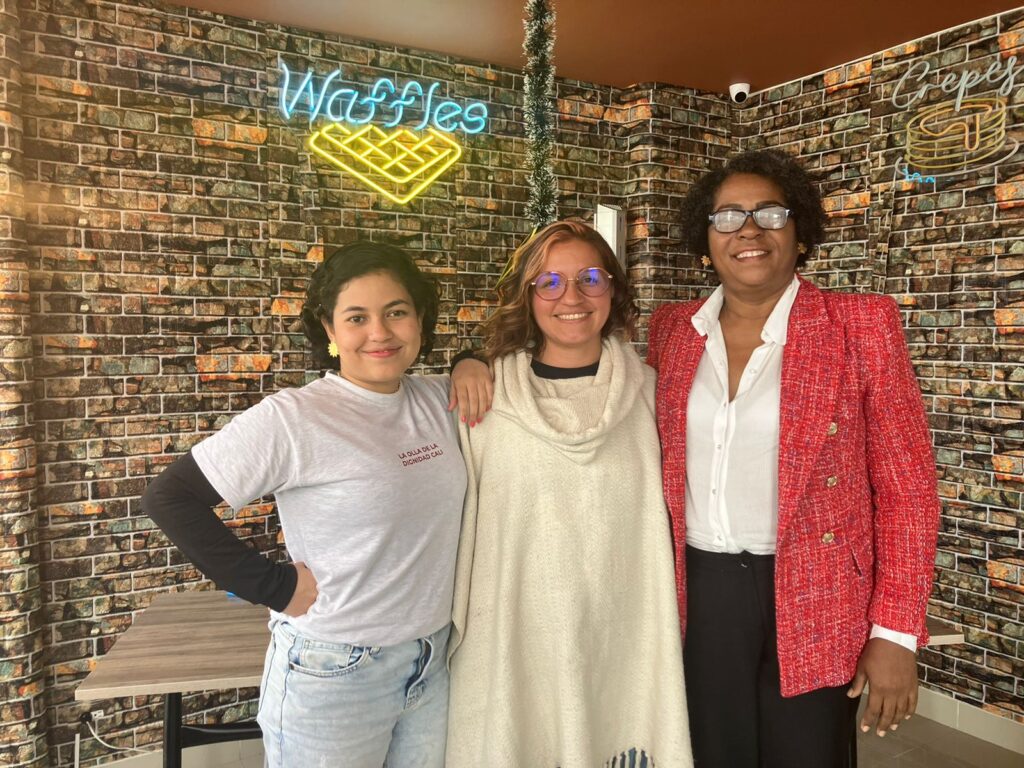
“As you may know this is the 20th birthday of Goldin Institute and I can’t think of a better way to celebrate our 20th anniversary than by welcoming you into our Global Family, congratulations to all of our new graduates on behalf of the Goldin Institute, and especially, on behalf of Diane Goldin, the Founder and Board chair of the organization.” - Travis Rejman, Executive Director of the Goldin Institute
Peace Day activities from South America
By Lissette Mateus Roa, Co-Facilitator, Goldin Global Fellows
In 1981, the United Nations declared that September 21 would be observed as the International Day of Peace, devoting the day to ‘commemorating and strengthening the ideals of peace within and among all nations and peoples’. Now, the day is observed worldwide with many grassroots leaders and activists using it as a day to promote their activities and causes. Our 2022 Global Fellows (Spanish Edition) have been doing just that, by utilizing this opportunity to engage with their communities, peers, politicians, and civil society groups to further messages and actions around peace and healing. See what some of them have been up to below.
En 1981, las Naciones Unidas declararon que el 21 de septiembre sería señalado como el Día Internacional de la Paz, dedicando el día a “conmemorar y fortalecer los ideales de paz dentro y entre todas las naciones y pueblos”. Ahora, el día es celebrado en todo el mundo por muchos líderes y activistas de base que lo ven como un día para promover sus actividades y causas. Nuestros Global Fellows 2022 (edición en español) han estado haciendo exactamente eso, al utilizar esta oportunidad para interactuar con sus comunidades, pares, políticos y grupos de la sociedad civil para promover mensajes y acciones en torno a la paz y la sanación. Vea lo que algunos de ellos han estado haciendo a continuación.

Peace agreement progress in Colombia
By Geiner Alfonso Arrieta Hurtado, Goldin Global Fellow from Colombia
For the International Day of Peace, I participated in a discussion on the commemoration of the 5 years of Colombia’s Peace Agreement organised by ONU and Conversa Foundation at the National University of Colombia, in La Paz Cesar. The Peace Agreement in Colombia, signed by the FARC-EP and the national government, yielded great expectations for Colombians to make our dream of total peace come true once and for all. That hope was ongoing for six years, starting with the dialogues in 2012 until the sign off day on Nov 24th 2016. It gave us optimism for the new generations for whom we do not want to inherit the same fifty years of sadness which we endured due to the armed conflict. All those who signed off on the peace agreement believe in stopping the armed struggle and share a desire to see democracy within our politics. We strongly trust in peace in territories where the will of doing things better is present in governors, institutions, and population.
Therefore, it is necessary to stop systematic murders to affected population, social leaders, and peace agreement signatories. Peace is not just about the ceasefire and halting shooting, but it is about personal wellbeing too.

En el Día Internacional de la Paz, participé en un conversatorio sobre la conmemoración de los 5 años del acuerdo de paz en Colombia, organizado por la ONU y la Fundación Conversa, en la Universidad Nacional de Colombia, en La Paz Cesar. El Acuerdo de Paz en Colombia, firmado por las FARC-EP y el Gobierno Nacional, generó grandes expectativas en los colombianos de hacer realidad, de una vez por todas, nuestro sueño de tener una paz total. Esa esperanza duró seis años, desde los diálogos de paz que empezaron en el año 2012 hasta el día de la firma del acuerdo de paz el 24 de noviembre de 2016. Nos dió optimismo para las nuevas generaciones, a las que no queremos heredar los mismos cincuenta años de tristeza que sufrimos por el conflicto armado. Todos los que firmaron el acuerdo de paz creen en la necesidad de detener la lucha armada y comparten el deseo de ver una democracia verdadera dentro de nuestra política. Confiamos firmemente en la paz en los territorios donde la voluntad de hacer las cosas mejor esté presente en gobernantes, instituciones y la población civil.
Por ello, es necesario frenar los asesinatos sistemáticos a la población afectada, líderes sociales y firmantes del acuerdo de paz. La paz no se trata solo del alto al fuego y la interrupción de los disparos, sino también del bienestar personal.

Food, Culture, and Memory for facilitating Peace in Argentina
From Diana Rocio Gomez Torres, Goldin Global Fellow from Argentina
On September 22nd, Trenzar Memorias, Network of studies on memory and culture, carried out a workshop on "Cooking memories: What does what we eat tell us about our society and culture?" within the framework of the International Day of Peace at the Tecnópolis student fair in the city of Buenos Aires. Our objective was to ignite within the high school students the curiosity for cultural studies and about memory from their daily lives; as well as contributing to the construction of peace through the recognition and respect for cultural differences in Latin America".

"Self-recognition and that of cultural differences are fundamental factors to building peace."
Trenzar Memorias, Red de estudios sobre memoria y cultura llevará a cabo el taller “Cocinando memorias: ¿Qué nos dice lo que comemos sobre nuestra sociedad y cultura?” El 22 de septiembre en el marco del día Internacional de la Paz y de la feria estudiantil Tecnópolis en la ciudad de Buenos Aires. Nuestro objetivo es despertar en las y los estudiantes de secundaria de Buenos Aires la curiosidad por los estudios culturales y sobre la memoria a partir de sus cotidianidades; así como contribuir a la construcción de la paz a través del reconocimiento y respeto de las diferencias culturales en América Latina.
"El reconocimiento propio y el de las diferencias culturales son factores fundamentales en la construcción de la paz."

Promoting community dialogue between migrant populations and locals along the Venezuelan-Colombian border
From Natasha Duque Torres, Goldin Global Fellow from Venezuela
“Last week we carried out some activities in commemoration of the International Day of Peace. We visited a settlement in the rural area of Cúcuta, which is a Colombian city which borders Venezuela; here resides a large Venezuelan migrant population living alongside the Colombian population, where both groups have been welcomed and integrated. During the activity, we not only strengthened the construction of peace, mediation, and conflict resolution for the leaders of the community, but we also had a space for recreation with the children to create strategies for them to be the builders of peace in their communities. They called themselves the first brigade of "Guardians of Peace" of the Belén settlement.

The goal of the “Guardians of Peace” is for children to learn about peace and replicate what they have learned at home, so that during episodes of differences or conflicts that arise in their home and their communities they play an essential role to solve conflicts. Fulfilling their dream of being peacemakers.

“La semana pasada decidimos realizar una actividad en conmemoración del día internacional de la paz, visitamos un asentamiento del área rural de Cúcuta, Norte de Santander, el cual está integrado por población migrante venezolana y población colombiana que acogieron y apostaron a la integración.
Durante la actividad no solo realizamos ejercicios de fortalecimiento en construcción de paz, mediación y resolución de conflictos con las lideresas de la comunidad, sino que además tuvimos un espacio de esparcimiento con los niños; Esto con la finalidad de crear estrategias para que ellos mismos sean los constructores de paz de sus comunidades. Durante la jornada, los niños se autodenominaron como “La Primera Brigada de Guardianes de la Paz" del asentamiento Belén. El objetivo de los Guardianes de la Paz es que lo niños aprendan diferentes temas en materia de paz y que puedan a su vez replicar esto en sus casas; así, durante los episodios de diferencias o conflictos que surjan en su hogar y sus comunidades, ellos pueden jugar un papel fundamental para resolverlos. Ellos sueñan con ser forjadores de paz.”

Freestyling for Change: inspiring youth in Caqueta, Colombia
By Lissette Mateus Roa, Facilitator, Goldin Global Fellows
We want to share the unique and inspiring journey of twenty-four year old Johnatan Cordoba from Florencia in the Caqueta region of Colombia. Johnathan is a 2022 Global Fellow (Spanish Edition). He is a trained attorney who combines his skills with the arts to support youth development and youth leadership through Flowrencia Crew (@flowrenciacrew).

What we particularly want to share is how the month of August transpired for him. Employment opportunities in Colombia, particularly for young attorneys, are not always easy to obtain. Johnathan managed to secure himself a position as a Municipal Police inspector, in the Municipality of Solita Caqueta, a small town in the south of Colombia. This region has endured armed conflict for the past 14 years, which makes Johnathan’s new position both rewarding and challenging however he is determined to be a role model for other young people.
“The activities that we provide in our community work are opportunities in which young people can be themselves and can express their vision of reality and their perceptions of it. Likewise, we work to generate sharing times to use free time in a good way, encouraging young people with trips and prizes such as: clothing or accessories. In our space we also seek to promote local talent through music, perhaps one day we will have a super star among us. Additionally, we also work with beatbox and at this moment from our territory we have the national champion in that discipline, which is why we are motivated to work with art and hope with it to provide tools for change and opportunities for personal improvement with them. Finally, I highlight the importance of freestyle and beatbox, to release repressed emotions, traumas, stress, and other negative situations that young people acquire from the environment, we work to create safe spaces and an escape door”.

Indeed, alongside his role as an attorney and police inspector, Johnathan believes that music and rapping/freestyling has significant potential for social change among youth. Johnathan’s freestyling recently landed him a great opportunity with a very famous Colombian comedian Lokillo (@lokilloflorez, who has a following of over 3 million people), who is doing a freestyle tour in the country. Johnathan was invited to participate in one of Lokillo’s shows in Florencia, Caquetá. Now, Johnathan’s area of residence (Solita) is not just quite a distance from where the show was being held (Florencia) but the terrain and route is not the most easy. He describes the journey as “going through a marathon” to be able to get to the show in time. Below you can see the journey he undertook followed by his performance on stage with Lokillo.
“It was important to share this stage with Lokillo because he recognized the work done, gave us visibility and he trusted that my talent would impact the audience (over 500 people) who had paid for the show. It was also very important to be able to get in touch with someone who is so relevant in Colombia, who listened to our work and who used his position to make us visible. It was so important that he has been kind enough to help us organize one larger event in our territory which will take place on October 29, in Florencia, Caquetá. His help consisted of motivating the young people in the community and providing us with supplies for the event. It should be noted that for these events we are also using the contributions made by Goldin Institute through 2022 Goldin Global Fellows in Spanish Language. In addition, it is necessary to state that the freestyle events we hold are important to transform my community; Caquetá is an area marked by internal armed conflict, so tools are required that achieve sensitivity in the community. Working with young people is vital, as it gives them a platform to use their free time while keeping them away from violence and other unfavorable environments”.
Unity, Peace and Reconciliation Through Soccer
By Omar Arturo Diaz, Goldin Global Fellow, Colombia
The “Peace and Unity festival” was initiated to use football as a fundamental element to hatch social ties, where different ways of thinking meet to look for new ways of reconciliation, social peace, and unity, so Colombia becomes the country we dream of. This year, we wanted to go further so we included some new activities, including discussion spaces, walking tours through our neighborhood, and of course our traditional “picadito” (local football matches between friends frequently played on non-professional courts). As a dissident family, we appreciate that popular football, peace, and unity need a conscious commitment from players, families, trainers, neighbors, and others who understand territory and sport as political and transforming ventures.

Keeping that in mind, in the last three years we have been developing the festival with the participation of different football, social, and political organizations. Doing so, we have built together a practical space where ideas, actions, and dreams are worked around the ball, encouraging peace and unity.

On 16th August 2022, the festival started with a forum where people gathered into activities, reflections, and ideas around popular football in Bogotá city. As a result, a regional link was built as well as the fostering of relations between participants, through dialogues and the stabilization of a common discourse. We were eager to keep creating dreams and envision a country where everybody can help without being condemned or stigmatized. Once there, we had the company of “Jaguar Rojo” and “Bukaneros”, two football schools that are already known in house.
Together, we looked forward to sharing ideas for what is going to be a new book, the name of which will be “Popular football: stories, actions, and reflections” to be published by our label “Imprenta rebelde”.

For the second day, we knew a lot about the soil situation in Ecuador from an interview broadcasted on “Ecos de Rumiñahui” radio station (fb.watch/fcQ9Ry0Jcy/). We took the opportunity to speak about former festivals as well and expand the discussion around football and its importance to build peace, especially in popular Colombian territories.
On the third day a group of female football players attended the forum, sharing from their title “Rebel football female players: between soccer and the academy”, where they explored the importance of women in popular football, especially against the idea that football is often considered as a masculine expression. These ‘rebel football women’ will also participate with their stories in our already mentioned soon-to-be launched book.

On the 4th day, we launched the first book through our self-management process created at our popular football school “La pelota rebelde”: “La pelota rebelde” publishers. Among other things, the book deals with the experiences of political prisoner and peacebuilder Jaison Murillo. The ceremony was made at the Bogotanian football temple El campín, and its public sports library. There, we had the participation of different points of view and experiences around prison, from people who want to transform the establishment.

The last day was covered by the main characters of our school: children, parents, grandparents, and all family – the rebel family. We enjoyed a kite festival where we tried to build consciousness about the territory around the Bogota River, highlighting that sports can also expose and remedy other issues that impact our town. This beautiful event ended with our traditional “Picadito por la paz y la unidad” (soccer match for peace and unity). We had 16 hours of consecutive football, which meant 17 matches. We also had some cultural events, where musical bands and artistic groups met at a local town court to declare peace and unity as fundamental to building the Colombian nation, the one we all dream of.
Social Movements and State Violence
By Diana Rocio Gomez Torres, 2022 Goldin Global Fellow, Argentina
Last Thursday, August 25, we held the discussion “Social Movements and State Violence: past and present” organized by Trenzar Memorias, Memory and Culture Network in Latin America and the Caribbean. The discussion took place at the Institute for Latin American and Caribbean Studies (IEALC), attached to the University of Buenos Aires in Argentina. We set ourselves two objectives: first, to discuss the role played by the indigenous movements of the Andean region of Latin America and to evaluate the repression that the State carried out against the Guatemalan indigenous people during the 1980s. Second, to discuss the social mobilizations that have taken place in Chile and Colombia between 2019 and 2021, as well as evaluating the place of the State and its response to these mobilizations.
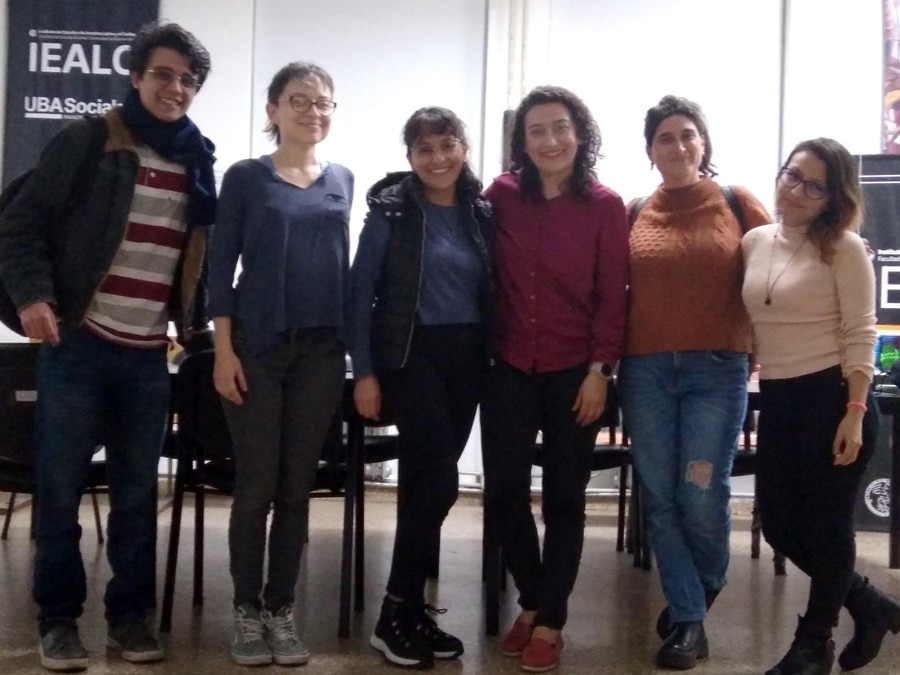
The discussion 'Social Movements and State Violence: Past and Present' is of interest to the academic community and to Latin American society in general because it allows us to reflect on the reconstruction of our recent past and find democratic solutions to the social crises of our present. -- Diana Rocio Gomez Torres, 2022 Goldin Global Fellow, Argentina
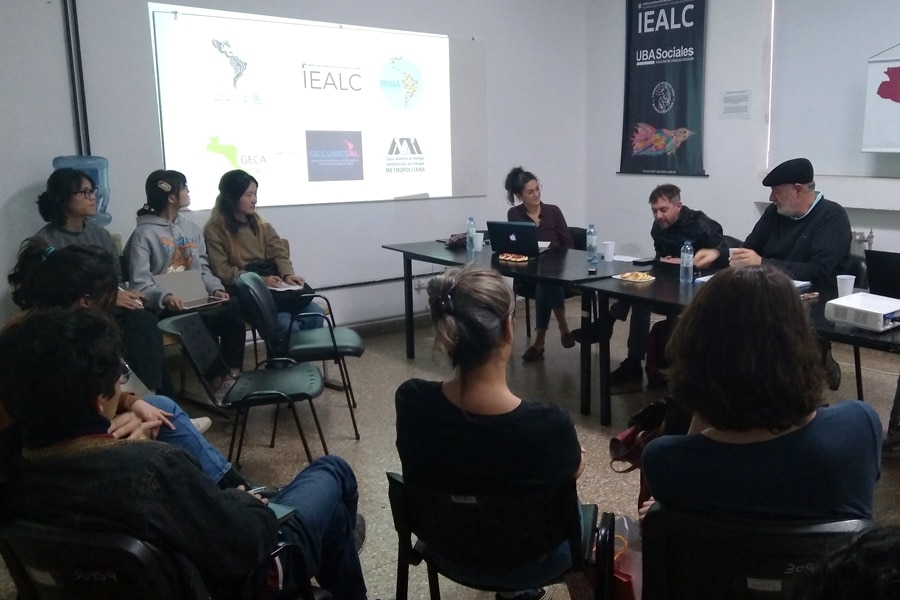
As Trenzar Memorias, we wanted to discuss the emergence of social movements in different countries of the region and the political changes that have been generated in recent years. We believe that reflection and visibility of the history and memory of these social movements are necessary, as well as the strategies of symbolic resistance that are facilitated by our cultures.
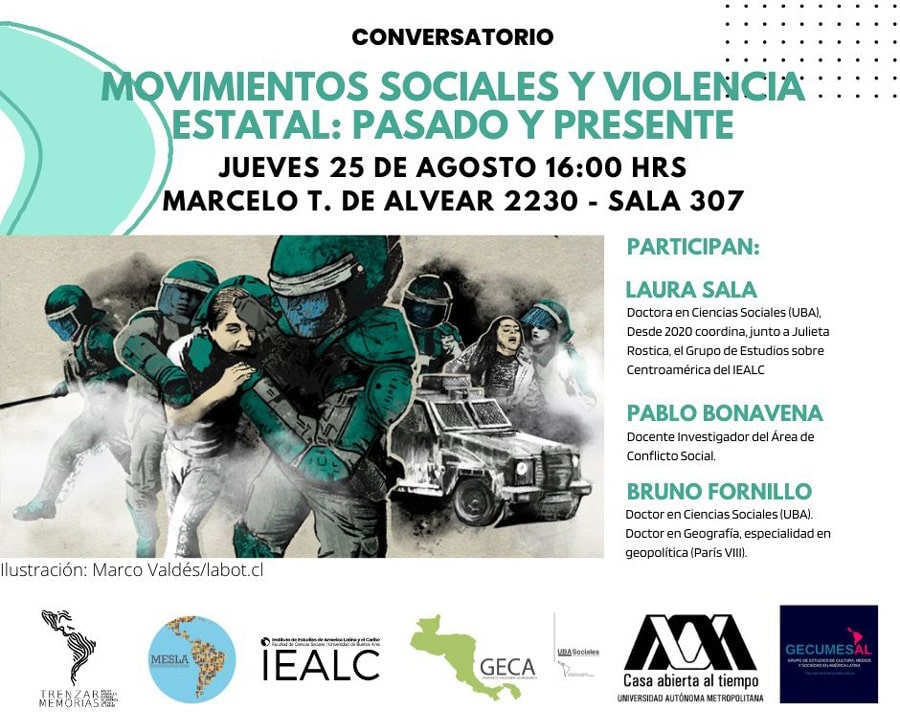
In the discussion we had the participation of three scholars who have researched the characteristics of social movements and State violence against civilian populations. Dr. Laura Sala spoke to us about the role of the State in the Guatemalan genocide. Dr. Pablo Bonavena established the relationships between the State and Social Movements throughout the history of the 20th century in Latin America. And finally, Dr. Bruno Fornillo spoke about the Indigenous movements of Ecuador, Mexico and Bolivia. and their actions during the 20th and 21st centuries.
One of the conclusions of the conversation is focused on characterizing the relations between the State and social movements, which can be understood using ‘Pacification theory’, which guides the actions of the State and also accounts for the limits of its domination when a revolt or social outburst arises. It is through this ‘pacification’ that the State builds mechanisms of domination over citizens to make social injustice tolerable. In this way, when social movements arise that claim new demands or the expansion of social or economic rights, that ‘pacification’ is called into question; and so the State's response is violent and repressive. That is to say, the emergence of social movements shows a crisis between the domination of the State and an intolerance for social injustice that until that point was allowed. Hence, the need to silence those dissenting voices of the leaders of social movements by the State, or the need to sit down and discuss the construction of a new margin of tolerance of social injustice with these actors.
To hold the event, we had the institutional support of various academic entities such as the Autonomous Metropolitan University of Mexico, the master’s degree in Social Studies in Latin America (MESLA), the Study Group on Culture and Media in Latin America (GECUMESAL), the Institute of Studies on Latin America and the Caribbean (IEALC), the Group of Studies on Central America; the latter four belonging to the University of Buenos Aires in Argentina.
The discussion is related to the dossier proposed for our third magazine Trenzar Memorias, which bears the same title "Social movements and state violence: past and present." In the following link you can find more information about the Network https://trenzarmemorias.org/
Colombia Protests Inequality
By Lissette Mateus Roa, Co-Facilitator, Global Alumni Network
Colombia is the third most unequal country in the world, and the gap is growing. That is what is causing the latest mass protests in the country.
Colombians no longer care about FARC guerrillas, they no longer protest nor fear this group that signed a peace agreement with President Santos 3 years ago. Now, Colombians have turned their eyes to the real problems that afflict the nation; a health care system that does not work, little chance of education, inequality, impunity and especially corruption. Above all, it is the corruption of politicians that keeps the country in a precarious state because the money that should be available for the benefit of a country is stolen by a few and the government persists in benefiting those few.

President Iván Duque, who was the candidate of the former president and now-Senator Álvaro Uribe Vélez, has neglected the peace agreements, has not complied with them, and instead has allowed new illegal groups in the country to start arming again to fight for routes of drug trafficking and land. Because of that, there are newly displaced people and new massacres again. In addition, due to the tax reforms that Ivan Duque is presenting before the congress and a new law lead by the political party of former President Álvaro Uribe, he has shown that it is a government that aims to favor the richest, widening the gap of inequality in the country.
There are specific requirements that are being presented to the government and for which the huge protest marches began on November 21, 2019:
- Reduction of war budget, which is larger than the health budget even though the FARC no longer exists.
- More budget for higher education, because only 10% of young lower social class students enter the university and only 48% of those are from official schools.
- That the government complies with the peace agreements, and stops the killing of demobilized people. Already 130 have been killed in the last 2 years.
- That the government stop the genocide of indigenous people and systematic murder of social leaders in the country. 134 indigenous people and more than 400 social leaders have been killed during the government of Iván Duque.
- That the government stop widening inequality gaps. That it desist in the tax reform (called the package), which raises taxes for the middle classes and lowers the taxes of large companies. It could reduce the salary of young people under 25 years old to 75% of the current minimum, eliminate the pension funds, and left with precarious work to the independent ones that are around 40% of the country workers.
To understand this reform a little more, along with the new law, it is important to know that in Colombia, 1 hour of work is paid 1 dollar, and the minimum salary is 236 dollars per month, but a congressperson in Colombia is paid 9,531 dollars per month, this means 40 time more than a minimum salary. The law proposed by the government pretends to make a flexible minimum salary, and have young people working per hours, or part time, which is going to be cheaper for employers, but precarious for workers who would have monthly salaries of less than 236 dollars. The government said it is a way to have more jobs for unemployed people who currently are 10% of population. Apart from that, they said they will reduce from 48 to 45 hours a week of work, but this is going to leave workers without two days a year in payment, which they used to have for having time with their families and without 2 extra hours a week of recreation. Moreover, workers won’t have Sunday as their rest day, but it could be any day of the week, even if they would not have time with their families because their day of rest does not match with their families’. And they won’t have payment for holidays either.
On the top of that, with the tax reform, the government wants that independent workers, which in Colombia is half of the workforce (about 11,800,000 people), pay 19% in taxes over their salary, knowing that they already pay about 21% of their salary in VAT and payments of health and pensions. Meaning that if an independent worker has a monthly income of 3,000, they should pay about 40% of their salary in taxes, VAT, and parafiscal contributions. While this happened with independent workers, the big enterprises will have a reduction in their tax payments from 33% to 30%, which will amount to a little bit more than 2 and a half billion dollars, which is double the budget for the country's university education, if we want to compare it. Another proposed law states that if companies hire young people less than 28 years old, they would have a 120% deduction on payments. In this sense, under this reform, along with the before mentioned proposed law, companies could hire people for less payment and less obligation, and they would have more deductions. What a great government for big companies!
Apart from that, the products already have a 19% VAT. For example, one gallon of petrol costs 2.60 dollars. All of this is going to widen the inequality gap and will make the rich richer, the middle classes unable to obtain more, and the poorest even poorer.
Despite all of the above, the government says it does not understand why citizens want to protest. For this reason, since the first march on the 21st, police and ESMAD (Mobile Riot Squadron) forces were deployed during the peaceful marches during the day. Because of that, citizens started a “Cacerolazo” from home, a form of protest in Latin America in which pots with spoons are beaten to make the government feel that the protestors are not vandals but an entire nation from their homes protesting peacefully. This sound was heard and spread throughout all neighborhoods and cities in Colombia.
To give you a sense of what these peacedful, if noisy, protests looked like, please watch this video taken at the street level and this video showing an overhead view.
On November 22 again there were marches and there were riots in different parts of the city (see video here). In the evening, President Ivan Duque decided to generate a general curfew in Bogotá and militarize the city. Somehow, a panic campaign was created – we still don’t known by whom it was orchestrated – through social networks, calls, and people entering residential complexes. It was said that they were going to destroy houses and that they were going to steal. It was a night of panic for the entire Bogota City. The next day, the mayor of the city said that all the alert calls were a lie and that it had been a dark campaign to generate chaos in the city.
After that night, many were afraid to go out and march. However, the marches continued on November 23, and in the afternoon hours, Dylan Cruz, 18 years old, was shot in the head by the ESMAD. Dylan was about to receive his high school grade on November 25, but instead, due to the impact, his body did not resist any more, and he died on his graduation day.
Despite all these marches and events going on, the president had said in his speeches he wanted to establish a dialogue. Last week, in the middle of the strike, the president passed the tax reform to the congress, and it was approved in the first plenary. The aforementioned law was also approved. In addition, the housing subsidy for the middle class was removed, and a law was passed to the congress so that the ESMAD could have more riot weapons. And the cherry on the cake was a law called Andrés Felipe Arias, named for a former minister of agriculture of prior President Álvaro Uribe, who was accused of giving land that should be for the poor to the rich, a scheme from which Alvaro Uribe Velez himself benefited. Andrés Felipe Arias was imprisoned in the United States and found guilty, as he was found guilty in Colombia. However, this law will allow him and many other corrupt individuals out of jails or house arrest and shorten their sentences.
Faced with this mockery and interweaving of laws and reforms to benefit a few, Colombians have not stopped marching.
Last Sunday, December 8, a march was called, that was supported by artists and was massive. The marches and protest will continue, but the government does not want to listen.
So, in this moment, we ask for international support for Colombian people. As Desmond Tutu said, “if you are neutral in situations of injustice, you have chosen the side of the oppressor.”
GATHER Alumni Focus on Child Soldiers, Mitigating Trauma

On August 6, Global GATHER alumni Lissette Mateus from Colombia, and Diana Alaroker and Geoffrey Omony from Uganda engaged in an online video conversation about child soldiers and war-affected children for their peers among the inaugural Gather Fellow cohort. They were joined by Theresa Betancourt, a Boston College professor who’s been performing a longitudinal, intergenerational study of former child soldiers in Sierra Leone.

The hour-long conversation included reflections and questions from GATHER alumni Jeff Waringa from Kenya, Alexander Gwanwalla from Cameroon, and Emma Rutikanga from Rwanda, who shared their experiential knowledge as well as shared challenges.
Lissette, the co-founder and visionary behind Serendipia, spoke to everyone on the video call about the challenges which she faces supporting de-mobilized female fighters as well as how she helps train communities in the “ESPERE” model for reconciliation and healing. From Gulu in northern Uganda, Diana and Geoffrey highlighted their concerns regarding the stigma which make it difficult for former child soldiers of the LRA (Lord’s Resistance Army) to successfully integrate into civilian life. Employment and housing demands often force young people into homelessness or extreme poverty, but YOLRED is uniquely positioned to address the lives of former child soldiers in northern Uganda as an organization created by ex-combatants such as Geoffrey, who spoke movingly about the impact of his experiences.

Theresa Betancourt directs the Research Program on Children and Adversity at Boston College, having formerly worked for international non-profit organizations such as the International Rescue Committee in places such as Uganda, Bosnia and Sierra Leone. She and her team of students in the college’s School of Social Work are undertaking research projects in countries throughout the world, including several in which GATHER Fellows are the principal organizations. Dr. Betancourt emphasized the need to understand and mitigate intergenerational trauma, especially when conflicts unfold over decades, or post-conflict mental health systems are not developed.
Following the video conversation, several Gather Fellows were connected with Dr. Betancourt ‘s program to continue the conversation and collaboration.
The full video of the webinar can be viewed here:
Perspective: Making Peace Sustainable in Colombia
By Lissette Mateus Roa, Co-Facilitator, Global Alumni Network
Just over a year ago, I experienced one of the saddest days in my life.
On that day in October 2016, Colombians faced a referendum on the peace process. After more than 50 years of conflict with FARC -- the oldest guerrilla movement on the continent -- and after three and a half years of negotiations, a cease fire agreement was signed by all the major fighting parties in front of the United Nations Secretary-General. We Colombians had the opportunity to approve the agreement through a popular vote, and sadly, 52% percent said “no,” while 40% didn’t even bother to vote.
"For the first time on my life, I felt embarrassed to be Colombian. I thought about going to live in another country."
But a week after the depressing rejection of peace, young people lit a fire that illuminated a path for the whole country. They started marching in cities throughout the country, demanding peace and a new agreement. Thanks to the youth-led mobilization across the country, a new agreement was ratified unanimously by the Colombian Congress.
We are hardworking and good natured people. What unites us is the hope of having a better future for our children, to be the generation that left a memorable footprint for others to follow, peacefully. We can show that destiny does not depend on our politicians: Rather, our destiny depends on us.
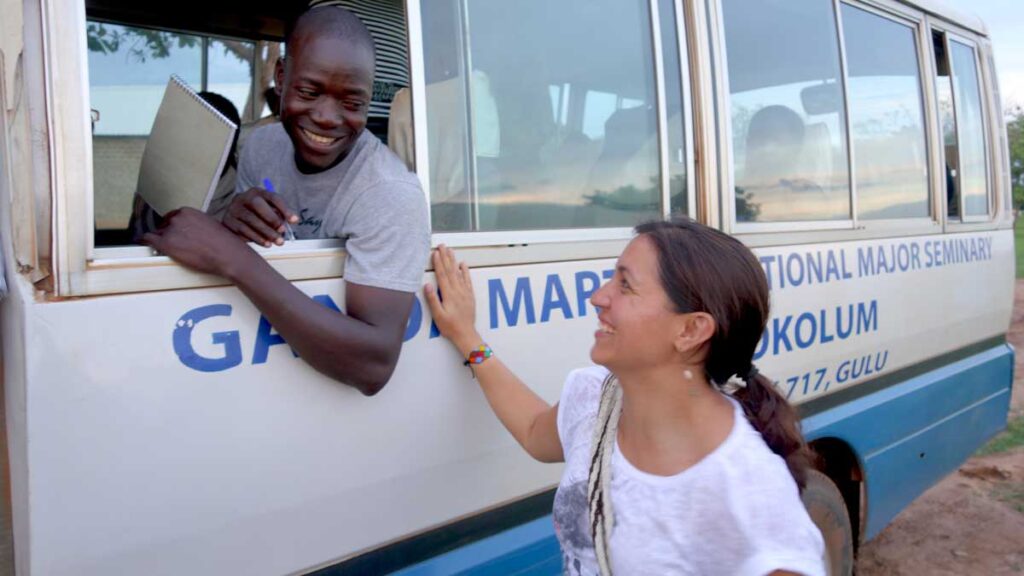
It has been almost a full year since ratification of the peace agreements between the Marxist guerilla group FARC-EP and the Colombian government. This historic agreement brings a formal end to more than 50 years of conflict in which an estimated 250,000 people were killed and an additional 60,000 are still missing. Although we have an agreement on paper, Colombians must rise to meet serious challenges in order for our fragile peace to survive. We must seize our opportunity. If we do, we can be an example for the world of how to overcome adversity, how to fight terrorism, and how to end an armed conflict in a country.
As a result of our historic agreement for peace and reconciliation, more than 7,000 guerrillas have come out from the jungle all across the country to the so-called Transitional Adjustment Zones (ZVTN). This mass demobilization was the first crucial step in the process of reintegration. Of critical importance, more than 11,000 FARC guerillas laid down their weapons turning over 7,132 guns. Through the provision of identity cards and a census, we now know crucial information that will enable us to design and implement reintegration plans. In this process, 112 child soldiers were demobilized and handed over to UNICEF and the Colombian government to begin the program "Differential Life Path." With the first phase of demobilization successfully completed, Colombians can now turn to the next step of reintegration of former guerrillas back into our communities.
On August 15, 2017, the Transitional Adjustment Zones changed to “Territories for Training and Reincorporation,” spaces where former combatants can receive the training, education and support they need to return home. There are 23 rural zones around the country created for demobilized combatants coming out from jungle who need space to live while they follow the process of giving up weapons and to start their preparation for re-entry into civil life. These spaces offer support a wide range of support including vocational training and secondary education.
In addition to the aforementioned support, each demobilized fighter is eligible to receive 2,000,000 Colombian pesos (approximately $680 USD) as well as a monthly stipend of 620,000 Colombian Pesos (or $204 USD), nearly equivalent to a minimum wage job, for 24 months. These resources are intended to be used during the education and training period to support the bridge between demobilization and eventual employment.
The last significant component of the demobilization process is transformation of the FARC from a guerilla movement to a political party. With FARC commander Timochenko laying down his arms to run for President, supporters and detractors are now able express their opinions with ballots rather than bullets.
The social changes since the war’s end are also represented in the subtle but profound evolution of the the group’s name from “armed” to “alternative”, now known as the “Common Alternative Revolutionary Force” (FARC).
In this historic but fragile moment, even peace is polarized. Opponents have taken advantage of the hopelessness of many, the ignorance of the peace agreements and the fear of repeating history to mislead through the media; regurgitating the hatreds, divisions and violence of our immediate past.
The truth is that we have learned to live with the war. We see homicides and war as normal. Our reaction when someone is killed or when there is a massacre is one of weary acceptance. “Oh, those poor people” we cry, but we don´t demand change. My husband and I march for peace with our children, while many of our friends, family members and neighbors just stay home. We are living in a violent culture and sometimes, we catch ourselves being violent. It’s complicated.
It is true that many issues remain to be addressed and much work needs to be done, but if we work together, we can make this peace legitimate and sustainable. Based on my journey growing up in Colombia and entering the larger world as a mother, spouse and advocate on behalf of former girl combatants, I would declare to the Colombian government, new political parties and all Colombian people that we must keep work together to ensure that war stays in our past.
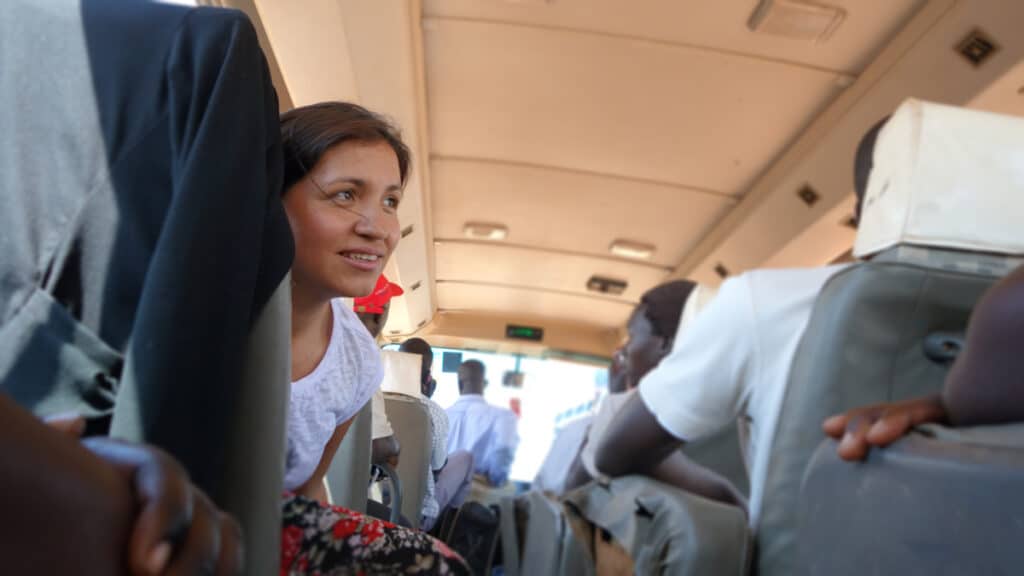
AVOIDING THE MISTAKES OF THE PAST:
Protect Demobilized Politicians
Now that the FARC has been constituted as a political party, there are already some red flags about a possible new genocide. Many Colombians remember the mass killing of members of the Union Patriotica (UP), a leftist Colombian political party founded by FARC, as well as the targeting of the Colombian Communist Party in 1985 after a previous peace process negotiation. At that moment, the UP suffered political violence that led to its extermination as a party, with more than 5,000 members who had laid down their arms being targeted and killed. Disturbingly, the report “Trochas de Paz y Esperanza: informe nacional de derechos humano” documents that between April 2017 and August 2017, 23 people tied to FARC were killed; 12 were FARC former combatants and 11 were relatives of former FARC members. This targeted killing must end.
Defend Human Rights Champions
In 2017, after the implementation of the peace agreement, according to the report of "Somos Defensores," 335 human rights defenders have been victims of some kind of aggression that has put their life at risk and 51 community leaders have been murdered. This political violence has special resonance in Colombia, and has long been used as a tool to intimidate and silence ideals and movements. However, even with the ceasefire and official end of hostilities, political violence has increased by 30% over last year.
End the Displacement
Leading organizations that monitor displacement in the country, such as the Ideas for Peace Foundation (FIP) and the UN agency for refugees (UNHCR), point out that despite the signing of agreements with the FARC, forced displacement continues. Despite the pledges and monitoring, Colombia continues to hold the dishonorable distinction of being number one in the world for internally displaced people. The UNHCR representative in Colombia stated that, "in recent years the figure has dropped. However, if we talk about 2017, UNHCR has registered 42 events of new displacement representing about 7,500 people. Most of the new displaced are indigenous or Afro-Colombian." The explanation for this phenomenon lies in the fact that in those areas that were left by FARC are now being disputed and controlled by other illegal groups.
Hold Government Accountable
Especially when it comes to implementing the peace agreement, our government is nearly non-functional. The processes that need to be carried out to implement the agreements are slow, impractical and ineffective. An example is the case of demobilization camps (ZVTN) that were not ready when the guerrillas arrived, despite the government's promises in the mutual agreement. According to the mission of the UN, through the month of May 2017, more than 50% of these green zones were not ready for use. In addition, the state has not occupied the territories that FARC left behind, leaving a vacuum of authority and order. Now, illegal groups are disputing these territories and deforesting our habitats to create new drug trafficking routes and to increase illicit crops. Due to crippling poverty and a lack of access to markets, peasants themselves are beginning to clear cut forests to use them for livestock and agriculture.
Stop the Corruption
Corruption is one of the greatest detriments to our society. Those who get into power, who should watch over the common good and the needs of the citizens who trusted them, focus on themselves and fill their pockets with what belongs to the citizenry. Magistrates, senators, mayors and even presidents are routinely exposed for links to paramilitaries, gangs and networks of white collar criminals. To understand the magnitude of this scourge, it is estimated that 50 billion pesos (over $17 million USD) are lost annually in Colombia because of corruption. In the last year alone, more than 19,000 people were indicted in Colombia for corruption. One recent scandal was the Odebrecht case where $11 million USD was paid in bribes to public officials to obtain infrastructure contracts between 2009 and 2011. But the worst was June, when our anti-corruption prosecutor Luis Gustavo Moreno Rivera himself was captured by an elite anti-corruption police unit.
Prepare for Elections
Soon there will be elections and the opposition will use all means to further polarize Colombia so that a new group can rise to power and undo the progress that has been made so far. Many Colombians live in fear and panic that the polarization of the country will tear apart our fragile social fabric and steal our chance at a lasting and sustainable peace. To avoid the pitfalls of past failures to reach peace, we need to prepare for fair, transparent elections and campaigns.
PURSUING PATHS TOWARDS A DURABLE PEACE:
It is true that these we have fallen into traps along the path to peace in the past, but we can avoid them if we work together. All of these issues that concern us must be seen as reasons for unity: Despite our differences, we need to join together to end these scourges that affect us all. The opportunities to repair our social bonds are now more visible, thanks to the disappearance of the oldest guerrilla in the continent.
One sign of hope was the recent visit of Pope Francis to Colombia. It was a political-religious event unlike anything else we have known. His visit amidst this turmoil managed to unite us, at least for a moment, offering a glimpse of a return to hope. The motto of this visit was "Let's take the first step." His message sought to galvanize Colombians to pursue peace and reconciliation. This motto has a deep meaning for us, because in order to be able to take the first step, it is necessary to get out of lethargy, petrification, fear and to overcome the normalization of the abnormal. It is necessary to recognize that violence in Colombia – and its hidden forms of inequality and inequity -- comes not only from illegal armed groups but also from all of us. Violence has been a force that has both underwritten and corrupted our culture and our society.
We live in a culture of violence. We have naturalized death, war, injustice, beatings and indifference, and that is why we urgently need to resignify ourselves as a country. We must together weave our future based on our shared values and not on our differences.
Following the call of Pope Francis, I offer three more steps that we must take together to create a path to durable peace:
Model the Peace
We must first look at ourselves deeply and recognize the specific moments in which we ourselves are violent. What is our daily contribution to the culture of violence that encases us?
A few months ago, in the middle of the peace process, the president of Colombia Juan Manuel Santos invited all citizens to disarm our language; acknowledging that we can make peace with the words we use and the way we communicate. Building on the call of President Santos, let us disarm not only our language, but our hearts, minds, thoughts and intentions.
Disarmament is not only for the FARC and other guerilla groups. We have to lay down the weapons of our language and thoughts that lead us to be violent in our homes, with our children and neighbors, in our places of work and worship.
As we look at ourselves and compare it with the reintegration process that is taking place for the demobilized, we can see that all Colombians need training and support, not just the FARC. We all must train ourselves to handle our emotions, act with compassion, to accept differences, and to be agents of positive change in society.
Ask yourself: What should I disarm in my own life? What can I contribute to a new culture of peace?
Unite in Empathy
"Taking the first step" fundamentally means that we need to recognize each other, empathize with each other's experiences. We need to begin by listening and trying to understand the paths travelled by the other without judging.
When we talk about FARC, we are not simply talking about an illegal armed group that it is demobilizing, we are talking about people. In this case, we are talking about more than 10,000 people, more than 10,000 families, more than 10,000 stories filled with very human experiences, pains, dreams and longings.
In this sense, research conducted by the National University of Colombia is instructive as it illuminates the human toll of the conflict. Through the census, we can glimpse the humanity of the people involved in the conflict. For example, we now know that most of the former combatants are peasants, 66% of whom came from rural areas, and that the war stole the childhood of almost half of them because 47% of them were recruited in their childhood.
Many are surprised to know that over one third of all combatants are women and girls, and nearly as many have a physical or mental ailment. More than half of those who recently demobilized have children, and since the signing of the agreement peace until March of this year, we have seen a “baby boom” with more than 77 babies born and 114 women pregnant in the demobilization camps. This surge in pregnancies shows their longing to start a new life and the hope they have for a better future.
We have learned a great deal about our demobilized neighbors through this groundbreaking study. For example, less than 300 have university degrees, with 57% having only primary school and just 21% possessing a secondary-level education. We know that demobilized Colombians are eager to take advantage of the chance to learn and further their studies.
To finish this small attempt to understand and empathize, we have learned also of their dreams and desires. Given that most of the demobilized are peasants, 60% want to return to the countryside and dedicate themselves to agricultural work. Thanks to the peace agreement, we have an opportunity to support these farmers as Colombia works to transition away for the production of illicit crops like coca cultivation.
By listening, we can see that the demobilized are fellow Colombians who are similar in so many ways. We can ask ourselves: What if we had been in their place? What would I have done? As we collectively take these first steps, we will uncover many more threads of connection that stich us together as we weave our future as a country.
Build Community Together
Once again, it is worth highlighting the words of the Pope Francis who ignited a spark of hope for reconciliation and a new future for Colombians:
"Reconciliation, therefore, becomes substantive and is consolidated by the contribution of all; it enables us to build the future, and makes hope grow. Every effort at peace without a sincere commitment to reconciliation is destined to fail.” -- Pope Francis
This peace is for all of us to share and depends on all of us to achieve. Conflict and violence in Colombia not only materializes through armed groups, but manifests in gender–based violence, violence against children, homicides, in everyday quarrels or interpersonal violence, crime, corruption and other types of violence that we live with day by day. All of us must recognize and seize this historic moment in which we have the opportunity to end the cycle of violence. Let’s take this chance to reflect about who we are as a society and work together towards who we want to become. The whole world is willing to give us a hand to achieve the peace that we have all longed for.
One of the best ways to contribute in this process is to become leaders and social entrepreneurs as an exercise of responsible citizenship. Anyone can work for love: We do not need a degree or a salary to transform our culture. We must only listen, recognize the needs of our community and contribute towards addressing them from our own abilities, knowledge and efforts.
The story of Colombia is unique. At the same time, we know that we can learn from our global partners and share what we have learned with communities across the globe. In Colombia, we look forward to taking the next steps on our journey towards peace with the support of the Goldin Institute's global network.
Reflections on Women's History Month from a Colombian Jail

[quote]Being in a Colombian jail working with women and girls who are serving time after being child soldiers is an interesting place from which to reflect on the last day of Women's History Month. The unique challenges and insights of women and girls who were child soldiers are often lost in the conversations about demobilizaiton in Colombia and around the world.[/quote]
I can't stop thinking about the story of María Mónica Sánchez Jaramillo who was conscripted at age 15 to fight with the guerilla. She was only one of the tens of thousands who have fought during this generations-long conflict here in Colombia. In the eight years she fought before leaving combat, Maria endured constant sexual abuse and a rape that resulted in a child. Today, she sits in prison serving the remaining time of a ten year sentence for fighting in the war.
Through Serendipity, the organization I co-founded, I have been working with many women and girls in Colombia as they go through the official reintegration process which for many means serving time in jail. I think hearing and learning from the stories of these former combatants is critical as the peace deal between the government and FARC comes to fruition and thousands prepare to turn in their guns and start a new wave of returnees entering the reintegration process.
[quote]Child soldiers, many of whom began as young girls, are coming home in Colombia and while their families are celebrating, not all of society is. [/quote]
Colombia’s FARC rebels released the first child soldiers of 2017, and while exact numbers are not known, a recent UNICEF report noted that over 6,000 children are still serving in armed groups but will hopefully soon be demobilized. Of those who have already demobilized in Colombia, 13% are women, and it is estimated that 40% of those waiting to disarm and return to civil society are female. Despite the numbers, there is still no specialized reintegration program for demobilized women. These women will face the same burdens as other demobilizing soldiers as well as unique difficulties in accessing opportunities in education, housing and the workforce after returning to their home communities.

In war, women and girls face distinct risks as compared to their male counterparts, starting with the by the breakdown of their traditional social and cultural roles as defined by society. Colombia is still in many ways a "Macho" society with patriarchal views of purity, care-giving, frailty and dependance. Further, demobilized women report high rates of sexual assualt, forced abortions, psychological and physical traumas, as well as community stigma. In Colombia, it is startling that women who suffered sexual and gender-based violence during combat have an estimated 74% risk of being victimized again in civilian life.
Organizations like ours, Serendipity, believe it is necessary to have community centers where group and individual activities canould be facilitated held based on a cross-curricular gender and restorative approach. While we work in many different ways to support peace, Serendipity is one of the few non-governmental organizations in Colombia -- or anywhere -- that have such a focus and expertise on the care and support of female ex-combatants. From our experiences with imprisoned former soldiers such as Maria, we understand that strengthening and developing the socio-emotional, academic and civic skills of these women and girls is the only way to a peaceful and just future.
A View From Afar: My Trip to Colombia

Goldin Institute Associate Srishtee Dear on her Recent Trip to Colombia to Attend the Foundation for Reconcilation Conference
Ten thousand feet in the sky, rocking back and forth in a cable car to our accent, we reached Monserrat, a tourist destination and holy site for Christians. Houses speckled the mass of incredible and incredibly populated land below us, sheltering approximately eight million people. With so many bodies, it is quite easy to dismiss the social implications of economic or political moves, easy to forget that with each body comes a story – a past, and a future.
I arrived to El Dorado International Airport with seven years of Spanish under my belt, which I quickly and laughably realized was the equivalent of a fourth grade level of fluency. Nevertheless, communication was never much of an issue during our stay. Father Leonel Narvaez, the founder for the Foundación para Pardón y Reconciliación, Lissette, our Global Associate and den mother, as well as all those in attendance of the ES.PERE conference, treated us with the utmost hospitability. Sixteen volunteers for La Foundación gathered together from South and North America for the same purpose– to improve the lives of their people through forgiveness and reconciliation.
[quote]With rebel groups such as FARC and ELN, as well as right-wing paramilitary forces, former child soldiers make up a decent percentage of the population, yet are quickly ostracized for their pasts. In it in these communities, where victims and perpetrators collide, that the ES.PERE model is needed most.[/quote]
In the U.S., social services are accessible for most people, as therapy and community meet-ups are a quick click and commute away. Yet, due to rampant instability in many South American countries, their citizens lack the basic foundation to trust institutions, as they have always had to fend for themselves. Sabas, a local hero amongst organizers at the Center for Reconciliation and a former child solider, said that the ES.PERE (Schools for Forgiveness and Reconciliation) programs aim to initially attract citizens by providing everyday trainings for them, such as “how to properly take a bath” and “music therapy” so they are more likely to return to learn about Forgiveness and Reconciliation, a concept foreign to many.

As I quickly came to realize throughout my trip, the Colombian people are some of the most heart-warming, inclusive, and diverse people I have had the pleasure to meet. Walking down the streets of La Candelaria, I felt like one of them. Their artistic brilliance and eagerness to help outsiders is one that often gets overlooked in the media portrayal of a 'drug-crazed land'. These are people who have had to live and relive a violent past, and livelihoods filled with prioritizing survival amidst left and right wing battles for power. Hearing former combatants speak to the importance of humanizing and reintegrating an entire sect of citizens helped me understand how many people lack a community. It is through community building efforts that a population grows and stabilizes. Just as in Colombia with the ES.PERE program, and now steadily throughout South America and parts of Africa, it is imperative that the social services we often take for granted, are also given to those who could benefit most.
